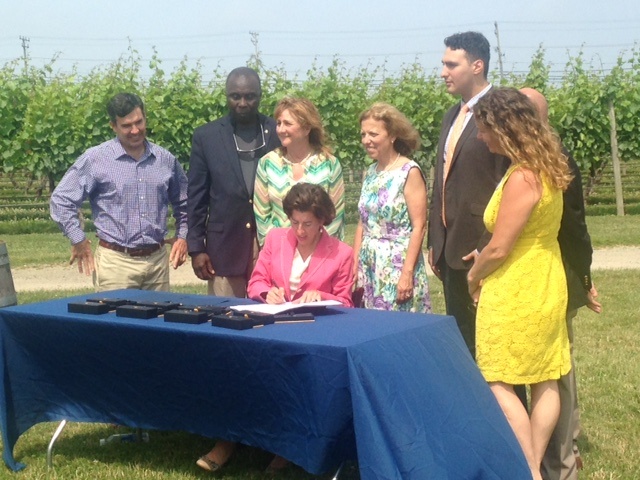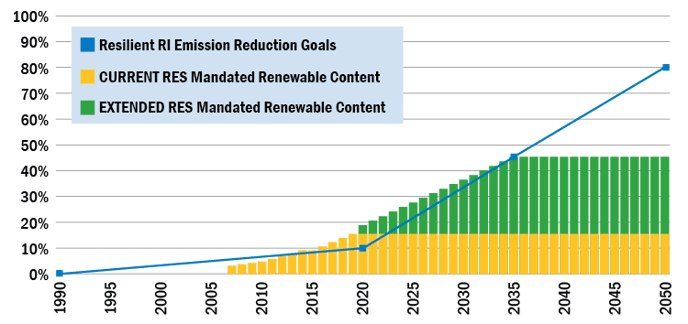The 2016 legislative session wrapped up on June 18. People’s Power & Light (PP&L) was a regular advocate at the Rhode Island State House and a supportive voice of key energy policies. Renewable energy certainly achieved some major wins this year, but other policies will have to try to earn passage again next session.
 Governor Raimondo signing the renewable energy bills at today’s ceremony while state legislators look on.
Governor Raimondo signing the renewable energy bills at today’s ceremony while state legislators look on.
Here are updates on the key energy poilicies that were in play this session:
Grow Green Jobs Package
To kick off the start of the legislative session, the Senate leadership introduced the “Grow Green Jobs RI” report to outline key policy recommendations. PP&L was excited that many of our own policy priorities were included in the document, such as the Renewable Energy Standard extension.
Renewable Energy Standard (RES)
Included in the Grow Green Jobs RI report was PP&L’s biggest policy priority for 2016: the Renewable Energy Standard (RES) extension. As we posted recently, the RES extension was successfully signed into law by Governor Raimondo. This was a big win for green power in Rhode Island! To us, this policy is a priority because of its importance insofar as achieving our greenhouse gas reduction goals.

Renewable Energy Growth program (REG)
The Renewable Energy Growth program (REG) was originally a successful pilot program known as the Distributed Generation Standard Contracts (DGSC) program. It brought local clean energy projects to Rhode Island. In 2014, PP&L lobbied to build the pilot into a permanent program, which came to be known as the REG. The 2014 REG program planned to increase in-state renewable projects by 40 megawatts (MW) each year for 5 years totaling 160 MW of additional clean power. This session, a Senate bill to extend the REG program for 10 more years and further build out our local green resources passed. But unfortunately, the measure never made it to a floor vote on the House side. PP&L is optimistic that next year this extension will pass.
Renewable Energy Fund (REF)
The Renewable Energy Fund (REF)was set to expire at the end of 2017. Fortunately, it survived the legislative session and was extended until 2022. The REF provides financial support for renewable energy projects of a different sort than the RES and REG.
Energy Efficiency for Delivered Fuels (i.e. Heating Oil and Propane)
PP&L has consistently advocated for the creation of an energy efficiency program for delivered fuels. Delivered fuels include homes or businesses that heat with oil or propane. Many customers benefit from the state’s electricity and natural gas efficiency programs and are able to save money on their monthly energy bills as a result. Heating oil and propane customers deserve a similar opportunity.
Efficiency benefits all of us as it defers expensive energy infrastructure upgrades and reduces local greenhouse gas emissions. Additionally, it prevents energy dollars from leaving the state for imported fuels. We were hopeful that 2016 would be the year for this program when we saw it included among the Senate’s policy recommendations.
Towards the end of the session, a bill was indeed introduced. The bill, although imperfect, was a step in the right direction and PP&L submitted written comments expressing our support of valuable changes it made. However, not long after it was introduced, the bill was withdrawn by the sponsor. Additional time and attention to this topic is needed to create and pass an effective bill. We hope that the prior to a bill being introduced next session.
Energize RI Act: Carbon Pricing
The Energize RI Act was designed to put a fair price on carbon dioxide pollution. Such a mechanism would reward energy efficient users and incentivize sustainable behaviors. A coalition of environmental and forward-thinking organizations, including PP&L, worked together to write a comprehensive bill that was introduced in the House. The spring hearing on it at the House Environment and Natural Resources committee was packed with supporters. However, the Senate side did not have a matching companion bill so the bill did not make it to a vote this year.
Green Municipal Aggregation
Green municipal aggregation makes it easy for towns to save on their electric bills AND support local renewable energy projects. By aggregating their electricity supply, towns and cities can negotiate a fair electric supply rate for their residents and include higher percentages of renewable energy than what is required by the Renewable Energy Standard. In past blog posts, we celebrated Melrose and Dedham as success stories in Massachusetts. Now it’s Rhode Island’s turn.
Existing Rhode Island law has too many procedural hurdles that make creating a municipal aggregation plan difficult. There were House and Senate companion bills this session designed to make the planning process easier. The measure passed the House but the bill did not make it to a Senate vote. PP&L was supportive of the bills and we’re disappointed they didn’t pass this year. We plan to educate our elected officials and community leaders about the value of municipal aggregation, especially to support local renewable energy sources, so they are ready to vote next session.
What’s Next?
You can expect to see PP&L and our members back at the State House next session to promote policies that will make Rhode Island and our energy system more sustainable. In the meantime, we will continue to work with our allies and members on these critical energy issues. Educating our community and our elected officials is an ongoing effort. If you want to help us with that, please call Kat Burnham at 800-287-3950 x202.




Comments